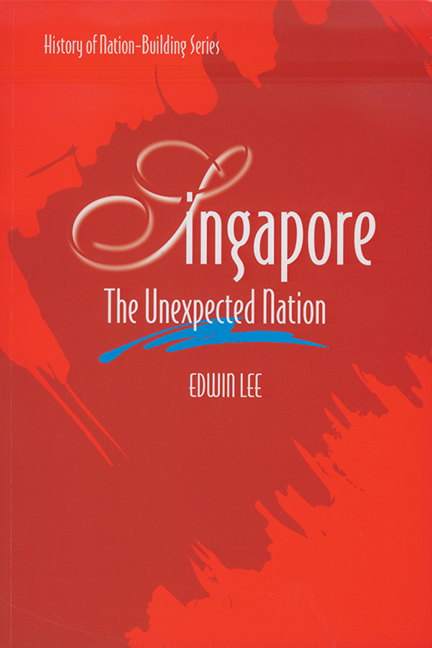Book contents
- Frontmatter
- Dedication
- Contents
- Preface
- Introduction by Wang Gungwu
- Chapter One Beginnings: From Temasek to Singapore
- Chapter Two Race, History and Nationalism
- Chapter Three Contestants and Contesting Visions
- Chapter Four The Accidental Chief Minister
- Chapter Five The Terminal Chief Minister
- Chapter Six The Embattled Prime Minister
- Chapter Seven Merger: Contesting Ownership and Principles
- Chapter Eight Terms of Disendearment
- Chapter Nine Dare to be Equal
- Chapter Ten The Way to Survive
- Chapter Eleven National Service: The Price of Independence
- Chapter Twelve Politics of Education
- Chapter Thirteen Home Ownership, National Stability and the New Middle Classes
- Chapter Fourteen University and Nation
- Chapter Fifteen Toh's Nation-Building Thrust
- Chapter Sixteen Nantah: Between Community and Nation
- Chapter Seventeen Self-Renewal: Talents for a Tough Act
- Chapter Eighteen The Consensual Prime Minister
- Chapter Nineteen Confucianism, Christianity, Chineseness
- Chapter Twenty Singapore Dreams, Singapore Dilemmas
- Chapter Twenty-One The Hyphenated Singaporean
- Chapter Twenty-Two The Unexpected Nation
- Bibliographical Note
- Index
- The Author
Chapter Three - Contestants and Contesting Visions
Published online by Cambridge University Press: 21 October 2015
- Frontmatter
- Dedication
- Contents
- Preface
- Introduction by Wang Gungwu
- Chapter One Beginnings: From Temasek to Singapore
- Chapter Two Race, History and Nationalism
- Chapter Three Contestants and Contesting Visions
- Chapter Four The Accidental Chief Minister
- Chapter Five The Terminal Chief Minister
- Chapter Six The Embattled Prime Minister
- Chapter Seven Merger: Contesting Ownership and Principles
- Chapter Eight Terms of Disendearment
- Chapter Nine Dare to be Equal
- Chapter Ten The Way to Survive
- Chapter Eleven National Service: The Price of Independence
- Chapter Twelve Politics of Education
- Chapter Thirteen Home Ownership, National Stability and the New Middle Classes
- Chapter Fourteen University and Nation
- Chapter Fifteen Toh's Nation-Building Thrust
- Chapter Sixteen Nantah: Between Community and Nation
- Chapter Seventeen Self-Renewal: Talents for a Tough Act
- Chapter Eighteen The Consensual Prime Minister
- Chapter Nineteen Confucianism, Christianity, Chineseness
- Chapter Twenty Singapore Dreams, Singapore Dilemmas
- Chapter Twenty-One The Hyphenated Singaporean
- Chapter Twenty-Two The Unexpected Nation
- Bibliographical Note
- Index
- The Author
Summary
The Trouble with the Term, “Malayan”
After the war, the British returned with a plan to make Malays, Chinese, Indians, Eurasians, and others equal citizens sharing a common Malayan identity. The plan involved, firstly, the political reconfiguration of the territories under British control. The British had three settlements on the Straits of Malacca and treaty arrangements to “advise” nine Malay states. Two settlements, Penang and Malacca, and the nine Malay states would be merged into a single unitary state. The sultans would be cajoled into transferring their sovereignty to the British monarch, thereby placing their states under direct rule by the British, which was a radical change from the previous status of indirect rule. The whole Malay peninsula thus became a crown colony, under the name Malayan Union, which was inaugurated on 1 April 1946. Singapore was reconstituted as a separate crown colony until the proper time for another imperial design to be worked out.
The nation-building aspect of the Malayan Union is seen in its provision, for the first time in Malaya, of a common citizenship for Malays and non- Malays alike. Citizenship would be granted to all who were local-born, and to immigrants who had stayed for ten years. Newcomers would need only five years’ residence to qualify.
The Malays feared that as a consequence of the Malayan Union they would become a dispossessed people in their own country. They rallied to protest under the leadership of a Johore aristocrat, Datuk Onn bin Jaafar, and the United Malays National Organization (UMNO) founded with him as president.
The British caved in and reached a compromise with the Malay rulers and UMNO on an alternative plan. There would still be a centralized state but under a federal arrangement. The governor of Malayan Union, the deputy of the British monarch, would be substituted by a British high commissioner for what would become the Federation of Malaya. The sultans would be restored to sovereignty, but as constitutional rulers. In the prewar era, the Malays, based on a certain interpretation of the treaties concluded between the sultans and Britain, had laid claim to a special position and special rights. These would be honoured in the new federation.
- Type
- Chapter
- Information
- SingaporeThe Unexpected Nation, pp. 51 - 98Publisher: ISEAS–Yusof Ishak InstitutePrint publication year: 2008

